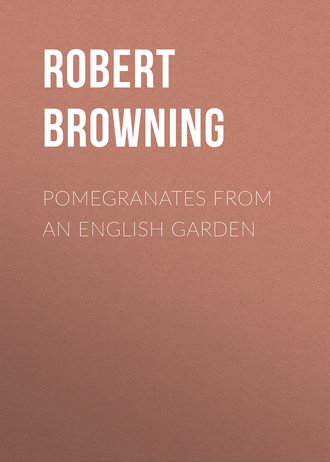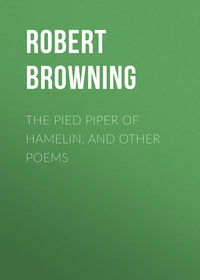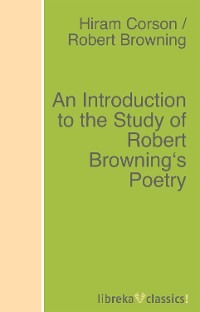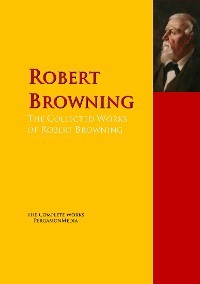 полная версия
полная версияPomegranates from an English Garden
The meaning of the third stanza will be apparent when it is remembered that “French Rudel” was a troubadour of the 12th century – the days of the Crusades, and of the romance of chivalry. In those days the best way to communicate with the East would be through some pilgrim passing thither: and nothing would be more natural than such a reference to the “device” which he had patiently, and in spite of difficulty, worked so as to wear it as her “favour:” and once more, it is eminently natural to represent the troubadour, not as sending a written message, but as finding a sympathetic pilgrim to burden his memory with it – charging him to keep it fresh by repetition till it had been duly delivered.
NEVER THE TIME AND THE PLACE
Never the time and the placeAnd the loved one all together!This path – how soft to pace!This May – what magic weather!Where is the loved one’s face?In a dream that loved one’s face meets mine,But the house is narrow, the place is bleakWhere, outside, rain and wind combineWith a furtive ear, if I strive to speakWith a hostile eye at my flushing cheek,With a malice that marks each word, each sign!O enemy sly and serpentineUncoil thee from the waking man!Do I hold the PastThus firm and fastYet doubt if the Future hold I can?This path so soft to pace shall leadThrough the magic of May to herself indeed!Or narrow if needs the house must be,Outside are the storms and strangers: we —Oh, close, safe, warm sleep I and she,– I and she!This poem, published in “Jocoseria” in 1883, has no connection with “Rudel,” published in “Bells and Pomegranates” in 1842; but it will naturally follow it as “another of the same,” only with a happier ending; for though we learn from history that poor Rudel did one day reach Tripoli, it was only to die there, – let us hope still looking “to the East – the East!”
We get a glimpse here of the shifting moods of a lover’s soul. First, there are the thoughts connected with the present experience – time and place all that could be desired, but the loved one, absent, (lines 1-5); next, thoughts arising from a dark dream or foreboding of the future when he and his loved one shall meet, but under circumstances cruelly unpropitious, the house narrow, the weather stormy, unsympathetic strangers by with furtive ears and hostile eyes, and even malice in their hearts (6-11); and last, the man within him rises to shake off the horrid serpent-like dream, and look forward with a healthy hope that time and place and all will be well; or, if the house must be narrow, (compare the Latin, “res angusta domi”) it will be a Home, storms and strangers without, peace and rest within!
WANTING IS – WHAT?
Wanting is – what?Summer redundant,Blueness abundant,– Where is the spot?Beamy the world, yet a blank all the same,– Framework which waits for a picture to frame:What of the leafage, what of the flower?Roses embowering with nought they embower!Come then, complete incompletion, O comer,Pant through the blueness, perfect the Summer!Breathe but one breathRose-beauty above,And all that was deathGrows life, grows love,Grows love!This is still the love of earth; but dealt with so grandly, that it is no wonder that some have understood it of the higher love, and to the question of the first line would give the answer, “God.” Nor can it be said that the thought is alien – rather is it close akin; for is not the earthly love, when pure and true, an image of the heavenly? It would be well, indeed, if love songs were oftener written in such a way as to suggest thoughts of the love of Heaven. The Bible is especially fearless in its use of the one to illustrate the other. With the higher thought in view, we are reminded of the closing lines of “The Rhyme of the Duchess May,” by Mrs. Browning —
“And I smiled to think God’s greatness flowed around our incompleteness —Round our restlessness, His rest.”Compare “By the Fireside,” especially stanza 39.
EVELYN HOPE
IBeautiful Evelyn Hope is dead!Sit and watch by her side an hour.That is her book-shelf, this her bed;She plucked that piece of geranium-flower,Beginning to die too, in the glass;Little has yet been changed, I think:The shutters are shut, no light may passSave two long rays through the hinge’s chink.IISixteen years old when she died!Perhaps she had scarcely heard my name;It was not her time to love; beside,Her life had many a hope and aim,Duties enough and little cares,And now was quiet, now astir,Till God’s hand beckoned unawares, —And the sweet white brow is all of her.IIIIs it too late then, Evelyn Hope?What, your soul was pure and true,The good stars met in your horoscope,Made you of spirit, fire and dew —And, just because I was thrice as old,And our paths in the world diverged so wide.Each was nought to each, must I be told?We were fellow mortals, nought beside?IVNo, indeed! for God aboveIs great to grant, as mighty to make,And creates the love to reward the love:I claim you still, for my own love’s sake!Delayed it may be for more lives yet,Through worlds I shall traverse, not a few:Much is to learn, much to forgetEre the time be come for taking you.VBut the time will come, at last it will,When, Evelyn Hope, what meant (I shall say)In the lower earth, in the years long still,That body and soul so pure and gay?Why your hair was amber, I shall divine,And your mouth of your own geranium’s red —And what you would do with me, in fine,In the new life come in the old one’s stead.VII have lived (I shall say) so much since then,Given up myself so many times,Gained me the gains of various men,Ransacked the ages, spoiled the climes;Yet one thing, one, in my soul’s full scope,Either I missed or itself missed me:And I want and find you, Evelyn Hope!What is the issue? let us see!VIII loved you, Evelyn, all the while!My heart seemed full as it could hold;There was place and to spare for the frank young smileAnd the red young mouth, and the hair’s young gold.So hush, – I will give you this leaf to keep:See, I shut it inside the sweet cold hand!There, that is our secret: go to sleep!You will wake, and remember, and understand.This poem, so exquisite in finish, well-nigh perfect in form, is one of the few works of our author, almost universally known and admired. It is doubtful, however, if all its admirers look beneath the form and finish, or understand much more of it than they do of other poems, the crabbed style of which repels admiration as strongly as this attracts it. The tender pathos of the “geranium leaf” in the first and last stanzas, touches a chord in every heart; but the thought of the piece is something far deeper and stronger, namely this, that true love is immortal, and that, therefore, however much it may fail of its object here, or even (if possible) in lives that follow this, it cannot fail for ever, it must find its object and be satisfied. It is a poem, not of the pathos of death, but of the promise of Life!
PROSPICE
Fear death? – to feel the fog in my throat,The mist in my face,When the snows begin, and the blasts denoteI am nearing the place,The power of the night, the press of the storm,The post of the foe;Where he stands the Arch Fear in a visible form,Yet the strong man must go:For the journey is done and the summit attained,And the barriers fall,Though a battle’s to fight ere the guerdon be gained,The reward of it all.I was ever a fighter, so – one fight more,The best and the last!I would hate that death bandaged my eyes, and forebore,And bade me creep past.No! let me taste the whole of it, fare like my peersThe heroes of old,Bear the brunt, in a minute pay glad life’s arrearsOf pain, darkness and cold.For sudden the worst turns the best to the brave,The black minute’s at end,And the elements’ rage, the fiend-voices that rave,Shall dwindle, shall blend,Shall change, shall become first a peace out of pain,Then a light, then thy breast,O thou soul of my soul! I shall clasp thee again,And with God be the rest!GOOD, TO FORGIVE
IGood, to forgive;Best, to forget!Living, we fret;Dying, we live.Fretless and free,Soul, clap thy pinion!Earth have dominion,Body, o’er thee!IIWander at will,Day after day, —Wander away,Wandering still —Soul that canst soar!Body may slumber:Body shall cumberSoul-flight no moreIIIWaft of soul’s wing!What lies above?Sunshine and Love,Sky-blue and Spring!Body hides – where?Ferns of all feather,Mosses and heather,Yours be the care!This is the proem to “La Saisiaz,” one of the most remarkable of the poet’s works, in which the doctrine of immortality is argued with a profundity of thought that has perhaps never been surpassed, even in language freed from the fetters of verse. It also appears as No. III. of “Pisgah Sights” in the second English series of selections. Both of these connections suggest the key-note.
Observe the progress in the thought. In the first stanza the soul is “fretless and free”; in the second it moves onward and upward; in the third it has reached the region of “Sunshine and Love, Sky-blue and Spring!” Similarly as to the body – in the first stanza there is the apparent victory of the grave, “dust to dust”; in the next comes the thought that, after all, the body may only be slumbering; in the last, there is the beautiful suggestion that it is only hiding where it is tenderly cared for, till
“ – with the morn those angel faces smileWhich we have loved long since, and lost awhile.”TOUCH HIM NE’ER SO LIGHTLY
“Touch him ne’er so lightly, into song he broke:Soil so quick-receptive, – not one feather-seed,Not one flower-dust fell but straight its fall awokeVitalizing Virtue: song would song succeedSudden as spontaneous – prove a poet-soul!”Indeed?Rock’s the song-soil rather, surface hard and bare:Sun and dew their mildness, storm and frost their rageVainly both expend, – few flowers awaken there:Quiet in its cleft broods – what the after ageKnows and names a pine, a nation’s heritage.These lines appeared first as the Epilogue to the second series of Dramatic Idyls, published in 1880. In October of the same year, the poet wrote, in the Album of a young American lady, a sequel to them, which appeared (in fac-simile) in the Century Magazine of November, 1882. They are given here, with the kind consent of the publishers of that magazine: —
Thus I wrote in London, musing on my betters,Poets dead and gone: and lo, the critics cried“Out on such a boast!” – as if I dreamed that fettersBinding Dante, bind up – me! as if true prideWere not also humble!So I smiled and sighedAs I ope’d your book in Venice this bright morning,Sweet new friend of mine! and felt tho’ clay or sand —Whatsoe’er my soil be, – break – for praise or scorning —Out in grateful fancies – weeds, but weeds expandAlmost into flowers, held by such a kindly hand!POPULARITY
IStand still, true poet that you are!I know you; let me try and draw you.Some night you’ll fail us: when afarYou rise, remember one man saw you,Knew you, and named a star!IIMy star, God’s glow-worm! Why extendThat loving hand of His which leads you,Yet locks you safe from end to endOf this dark world, unless He needs you,Just saves your light to spend?IIIHis clenched hand shall unclose at last,I know, and let out all the beauty:My poet holds the future fast,Accepts the coming ages’ duty,Their present for this past.IVThat day, the earth’s feast-master’s browShall clear, to God the chalice raising;“Others give best at first, but Thou“Forever set’st our table praising,“Keep’st the good wine till now!”VMeantime, I’ll draw you as you stand,With few or none to watch and wonder:I’ll say – a fisher, on the sandBy Tyre the old, with ocean-plunder,A netful, brought to land.VIWho has not heard how Tyrian shellsEnclosed the blue, that dye of dyesWhereof one drop worked miracles,And coloured like Astarte’s eyesRaw silk the merchant sells?VIIAnd each bystander of them allCould criticize, and quote traditionHow depths of blue sublimed some pall– To get which, pricked a king’s ambition;Worth sceptre, crown and ball.VIIIYet there’s the dye, in that rough mesh,The sea has only just o’er-whispered!Live whelks, each lip’s beard dripping fresh,As if they still the water’s lisp heardThrough foam the rock-weeds thresh.IXEnough to furnish SolomonSuch hangings for his cedar-house,That, when gold-robed he took the throneIn that abyss of blue, the SpouseMight swear his presence shone.XMost like the centre-spike of goldWhich burns deep in the blue-bell’s wombWhat time, with ardours manifold,The bee goes singing to her groom,Drunken and overbold.XIMere conchs! not fit for warp or woof!Till cunning come to pound and squeezeAnd clarify, – refine to proofThe liquor filtered by degrees,While the world stands aloof.XIIAnd there’s the extract, flasked and fine,And priced and saleable at last!And Hobbs, Nobbs, Stokes and Nokes combineTo paint the future from the past,Put blue into their line.XIIIHobbs hints blue, – straight he turtle eats:Nobbs prints blue, – claret crowns his cup:Nokes outdares Stokes in azure feats, —Both gorge. Who fished the murex up?What porridge had John Keats?The true poet is he who discovers and discloses, for man’s recognition and enjoyment, the hidden beauties which abound everywhere in the great kingdom of God. These beauties may be unrecognised at first, so that the poet is not known as a poet, except to such as the speaker here is supposed to be (“I know you”). He recognises in him a star. How is it, then, that his light is hidden? The hand of God, who looks down on him from far above (“God’s glow-worm”) as I look up to him from far below (“my star”), has closed around him to keep him and his light safe till the time shall come for discovery (Stanza 3) and for recognition (4). The drawing, or simile follows, of a Tyrian fisherman (5), who brings from the great sea the common-looking little whelk, from which, by a secret process, is obtained that wonderful dye which out-dazzles art, and almost equals Nature’s most exquisite tints (6-10). While the process is going on, the world stands aloof (11); but as soon as the extract is “priced and saleable,” the commonest people (12) can recognise it and make it pay (13); while the man who fished it up remains poor and unknown to fame.
The application is made with characteristic brevity, oddity, and antithetic power: Nokes, Stokes, & Co., gorging turtle; John Keats wanting porridge!
In connection with “Popularity” should be studied “The Two Poets of Croisic,” far too long to be inserted here. An interesting comparison, also, may be made with a little poem of Tennyson’s called “The Flower,” beginning —
“Once in a golden hourI cast to earth a seed,Up there came a flower,The people said, a weed.”THE GUARDIAN-ANGEL
A PICTURE AT FANOIDear and great Angel, wouldst thou only leaveThat child, when thou hast done with him, for me!Let me sit all the day here, that when eveShall find performed thy special ministry,And time come for departure, thou, suspendingThy flight, may’st see another child for tending,Another still, to quiet and retrieve.IIThen I shall feel thee step one step, no more,From where thou standest now, to where I gaze.– And suddenly my head is covered o’erWith those wings, white above the child who praysNow on that tomb – and I shall feel thee guardingMe, out of all the world; for me, discardingYon heaven thy home, that waits and opes its door.IIII would not look up thither past thy headBecause the door opes, like that child, I know,For I should have thy gracious face instead,Thou bird of God! And wilt thou bend me lowLike him, and lay, like his, my hands together,And lift them up to pray, and gently tetherMe, as thy lamb there, with thy garment’s spread?IVIf this was ever granted, I would restMy head beneath thine, while thy healing handsClose-covered both my eyes beside thy breast,Pressing the brain which too much thought expands,Back to its proper size again, and smoothingDistortion down till every nerve had soothing,And all lay quiet, happy and suppressed.VHow soon all worldly wrong would be repaired!I think how I should view the earth and skiesAnd sea, when once again my brow was baredAfter thy healing, with such different eyes.O world, as God has made it! All is beauty:And knowing this, is love, and love is duty.What further may be sought for or declared?VIGuercino drew this angel I saw teach(Alfred, dear friend!) – that little child to pray,Holding the little hands up, each to eachPressed gently, – with his own head turned awayOver the earth where so much lay before himOf work to do, though heaven was opening o’er him,And he was left at Fano by the beach.VIIWe were at Fano, and three times we wentTo sit and see him in his chapel there,And drink his beauty to our soul’s content– My angel with me too: and since I careFor dear Guercino’s fame (to which in powerAnd glory comes this picture for a dower,Fraught with a pathos so magnificent),VIIIAnd since he did not work thus earnestlyAt all times, and has else endured some wrong —I took one thought his picture struck from me,And spread it out, translating it to song.My love is here. Where are you, dear old friend?How rolls the Wairoa at your world’s far end?This is Ancona, yonder is the sea.“The Guardian Angel” is given as a slight specimen of an important class, dealing with painting and painters. In the lovely poem, “One Word More,” Browning disclaims all ability to paint; but no one could have a more exquisite appreciation of the art.
Has the tender pathos of these verses ever been surpassed? The calm of heaven is in this thought spread out – translated into song. Let it be read in connection with Spenser’s exquisite lines, beginning “And is there care in heaven?”
“Alfred, dear friend,” is Mr. Alfred Domett, who was then Prime Minister of New Zealand, at which far end of the world the Wairoa rolls to the sea.
DEAF AND DUMB
A GROUP BY WOOLNEROnly the prism’s obstruction shows arightThe secret of a sunbeam, breaks its lightInto the jewelled bow from blankest white;So may a glory from defect arise:Only by Deafness may the vexed love wreakIts insuppressive sense on brow and cheek,Only by Dumbness adequately speakAs favoured mouth could never, through the eyes.This is a “gem of purest ray.” In order to understand it fully, it is necessary to know that the “group by Woolner” is of two deaf and dumb children – the one as if speaking, the other in the attitude of listening. The speech denied passage through the lips, breaks out in rarer beauty from the eyes; and for the hearing denied entrance by the ears, there is, instead, a subtle responsiveness of brow and cheek to the spirit utterance from the soul of the other; so that love, though “vexed,” is not suppressed.
The exquisite beauty of the illustration of “the prism’s obstruction,” and the tender pathos of the thought, will be manifest to every reader.
ABT VOGLER
(AFTER HE HAS BEEN EXTEMPORIZING UPON THE MUSICAL INSTRUMENT OF HIS INVENTION.)IWould that the structure brave, the manifold music I build,Bidding my organ obey, calling its keys to their work,Claiming each slave of the sound, at a touch, as when Solomon willedArmies of angels that soar, legions of demons that lurk,Man, brute, reptile, fly, – alien of end and of aim,Adverse, each from the other heaven-high, hell-deep removed, —Should rush into sight at once as he named the ineffable Name,And pile him a palace straight, to pleasure the princess he loved!IIWould it might tarry like his, the beautiful building of mine,This which my keys in a crowd pressed and importuned to raise!Ah, one and all, how they helped, would dispart now and now combine,Zealous to hasten the work, heighten their master his praise!And one would bury his brow with a blind plunge down to hell,Burrow awhile and build, broad on the roots of things,Then up again swim into sight, having based me my palace well,Founded it, fearless of flame, flat on the nether springs.IIIAnd another would mount and march, like the excellent minion he was,Ay, another and yet another, one crowd but with many a crest,Raising my rampired walls of gold as transparent as glass,Eager to do and die, yield each his place to the rest:For higher still and higher (as a runner tips with fire,When a great illumination surprises a festal night —Outlining round and round Rome’s dome from space to spire)Up, the pinnacled glory reached, and the pride of my soul was in sight.IVIn sight? Not half! for it seemed, it was certain, to match man’s birth,Nature in turn conceived, obeying an impulse as I;And the emulous heaven yearned down, made effort to reach the earth,As the earth had done her best, in my passion, to scale the sky:Novel splendours burst forth, grew familiar and dwelt with mine,Not a point nor peak but found, but fixed its wandering star;Meteor-moons, balls of blaze: and they did not pale nor pine,For earth had attained to heaven, there was no more near nor far.VNay more; for there wanted not who walked in the glare and glow,Presences plain in the place; or, fresh from the Protoplast,Furnished for ages to come, when a kindlier wind should blow,Lured now to begin and live, in a house to their liking at last;Or else the wonderful Dead who have passed through the body and gone,But were back once more to breathe in an old world worth their new:What never had been, was now; what was, as it shall be anon;And what is, – shall I say, matched both? for I was made perfect too.VIAll through my keys that gave their sounds to a wish of my soul,All through my soul that praised as its wish flowed visibly forth,All through music and me! For think, had I painted the whole,Why, there it had stood, to see, nor the process so wonder-worth.Had I written the same, made verse – still, effect proceeds from cause,Ye know why the forms are fair, ye hear how the tale is told;It is all triumphant art, but art in obedience to lawsPainter and poet are proud, in the artist-list enrolled: —VIIBut here is the finger of God, a flash of the will that can,Existent behind all laws: that made them, and, lo, they are!And I know not if, save in this, such gift be allowed to man,That out of three sounds he frame, not a fourth sound, but a star.Consider it well: each tone of our scale in itself is nought;It is everywhere in the world – loud, soft, and all is said:Give it to me to use! I mix it with two in my thought,And, there! Ye have heard and seen: consider and bow the head!VIIIWell, it is gone at last, the palace of music I reared;Gone! and the good tears start, the praises that come too slow;For one is assured at first, one scarce can say that he feared,That he even gave it a thought, the gone thing was to go.Never to be again! But many more of the kindAs good, nay, better perchance: is this your comfort to me?To me, who must be saved because I cling with my mindTo the same, same self, same love, same God: ay, what was, shall be.IXTherefore to whom turn I but to Thee, the ineffable Name?Builder and maker, thou, of houses not made with hands!What, have fear of change from thee who art ever the same?Doubt that thy power can fill the heart that thy power expands?There shall never be one lost good! What was, shall live as before;The evil is null, is nought, is silence implying sound;What was good, shall be good, with, for evil, so much good more;On the earth the broken arcs; in the heaven, a perfect round.XAll we have willed or hoped or dreamed of good, shall exist;Not its semblance, but itself; no beauty, nor good, nor powerWhose voice has gone forth, but each survives for the melodist,When eternity affirms the conception of an hour.The high that proved too high, the heroic for earth too hard,The passion that left the ground to lose itself in the sky,Are music sent up to God by the lover and the bard;Enough that he heard it once: we shall hear it by-and-by.XIAnd what is our failure here but a triumph’s evidenceFor the fulness of the days? Have we withered or agonized?Why else was the pause prolonged but that singing might issue thence?Why rushed the discords in, but that harmony should be prized?Sorrow is hard to bear, and doubt is slow to clear,Each sufferer says his say, his scheme of the weal and woe:But God has a few of us whom he whispers in the ear;The rest may reason and welcome; ’tis we musicians know.XIIWell, it is earth with me; silence resumes her reign:I will be patient and proud, and soberly acquiesce.Give me the keys. I feel for the common chord again,Sliding by semitones, till I sink to the minor, – yes,And I blunt it into a ninth, and I stand on alien ground,Surveying awhile the heights I rolled from into the deepWhich, hark, I have dared and done, for my resting-place is found,The C major of this life: so, now I will try to sleep.Having given specimen poems dealing with the arts of poetry, painting, and sculpture, we add one on the subject of music, which, though difficult to understand fully, has beauties which are apparent even to those who do not enter into its deepest thought. Vogler is not known as a composer of the first rank, having left no works behind him which entitle him to a place among the great masters; but, for this very reason, he is better suited for the poet’s purpose, which is to deal with music, not as represented by printed notes, but as existing for the moment in all its perfection, and at once melting away into silence and apparent nothingness. It is as extemporizer, not as author, he is chosen, and as Abbé (Ger. Abt) he appropriately thinks of those deep spiritual truths on which the loftier hopes of the latter part of the poem are founded.






